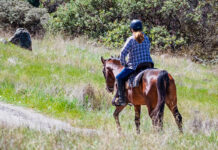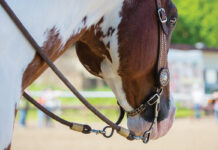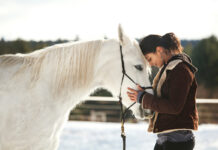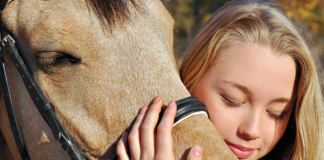
The best way to cure a pushy horse is to earn his respect by doing groundwork exercises with him. A respectful horse is a willing horse. When you ask him to move, he instantly moves. When you walk, he walks beside you like a shadow. When you go in his stall, he gives you two eyes and comes to you; he wants to be your partner.
Every time your horse pins his ears, tries to kick or bite you, steps on your foot or pushes you out of his way, he is being disrespectful. Allowing a disrespectful animal to invade your space creates a dangerous situation.
Stop a Space Invader
Your first order of business is to not allow your horse to invade your space. Anytime you’re with him, keep him out of what I like to call your personal “hula hoop” space—a 4-foot circle that surrounds you and serves as your safety zone. Imagine that there’s a 4-foot circle drawn around you—almost like an invisible electric fence. Unless you invite the horse into your space, he should stay a respectful, safe distance away from you.
I honestly don’t believe that most horses intend to hurt us. They just don’t realize that they’re bigger and stronger than us. Your horse is roughly 10 times your weight. He’s in a 1,200-pound category and you’re in a 120- to 200-pound category. Your horse may not necessarily mean to hurt you, but because of his size, if he comes into contact with you, it can hurt. For example, when a horse kicks another horse in the belly, the kicked horse grunts, walks a few feet away and starts eating grass again like nothing ever happened. It doesn’t really bother him. But if you get kicked in the ribs by a horse, you’re in the hospital for a week with seven broken ribs. It’s the same kick, but it means a lot more to you because you’re a smaller creature.
By being conscious of keeping your horse out of your personal space, you’ll stay safe while working around him and earning his respect.
Push Back
One of the most effective exercises for nipping pushy behavior in the bud is yielding the horse’s forequarters (click here for a video of this exercise). When a horse pushes into you, he uses his neck and shoulders to barge into your space and direct you where he wants to go. The horse’s head and neck are basically his steering wheel. The better control you can get of his steering wheel, the more responsive he will be. Horses seem to have an entirely different perspective of you when they know you have the power to drive their front end away, because they know that if you are able to do that, they no longer can push you around. Once your horse knows the exercise, you can use it anytime he gets pushy around you—at feeding time, while leading him, et cetera.
Keeping a pushy horse in check comes down to daily maintenance—being aware of the behavior you’re allowing your horse to get away with. If you teach him to yield and move away from pressure, he will be respectful of you.
Clinician CLINTON ANDERSON owns and operates Downunder Horsemanship in Stephenville, Texas, where his method of horsemanship has helped to transform the relationships between thousands of horses and riders. He also hosts two training programs that air weekly on Fox Sports Net and RFD-TV.
www.downunderhorsemanship.com
This article originally appeared in the May 2014 issue of Horse Illustrated. Click here to subscribe.






Excellent advice to remember that it is an ongoing practice.
Just love this article. We all get to compacent with our horses then when someone gets hurt “its the horses fault” when reaaly it is always us.
Great advice.
I will have to give these idea a try…if spring ever gets here.
hmm, good ideas.
Hey, I know that horse….it’s mine!! Better practice some of these ideas.
cool
Some great ideas…now just waiting until spring gets here.
My horse can get pushy at times, I don’t think she means it either. But I’m going to try that hula hoop idea, thanks.
I have a 6 yearold mare that is only halter trained and is very pushy, we are having trouble even just feeding her because she will kick the fence and get angry if you take to long with her grain . I’m not scared of her and stand my ground when in the pen but my mom says she is afraid that one day she will sneak up on me. She come up behind me when I’m messing with the other horses but has always backed off my mom just want to correct the behavior and I want her to have some ground manners and be a little more polite as I’m looking to send her off for training in the spring.
I have a 2 year old stud colt and being honest he is super spoiled and we used to play tag and stuff in his pen when he was younger and he has a thing for grabbing your clothes with his teeth and biting when hes frustrated and he scares people when he does this so they have taught him that he is boss and he is now turning aggressive with it, although I never am scared of him and I trust him too much everyone says. It also seems the more aggressive a person is with him the more stubborn and aggressive he seems to get. I plan on castrating him this summer an doing some of your exercises and training and hoping he cools it down a little. I just love this horse with all my heart and would like it if everyone else actually liked him too.